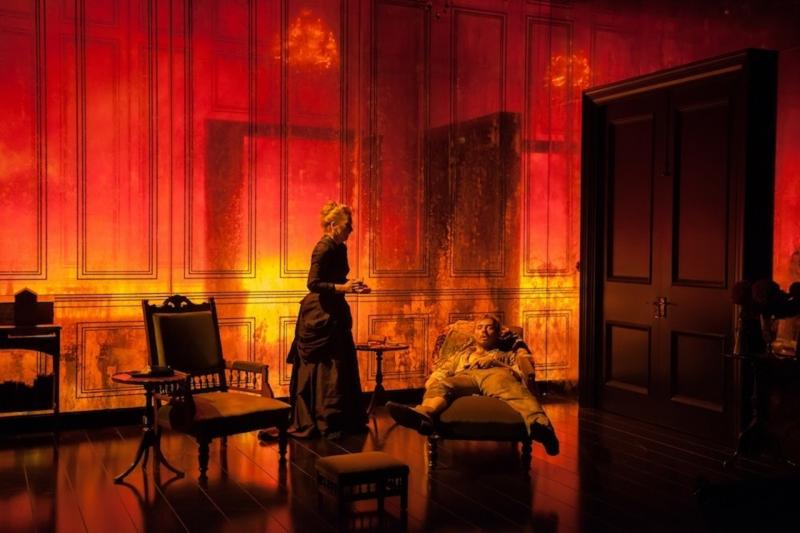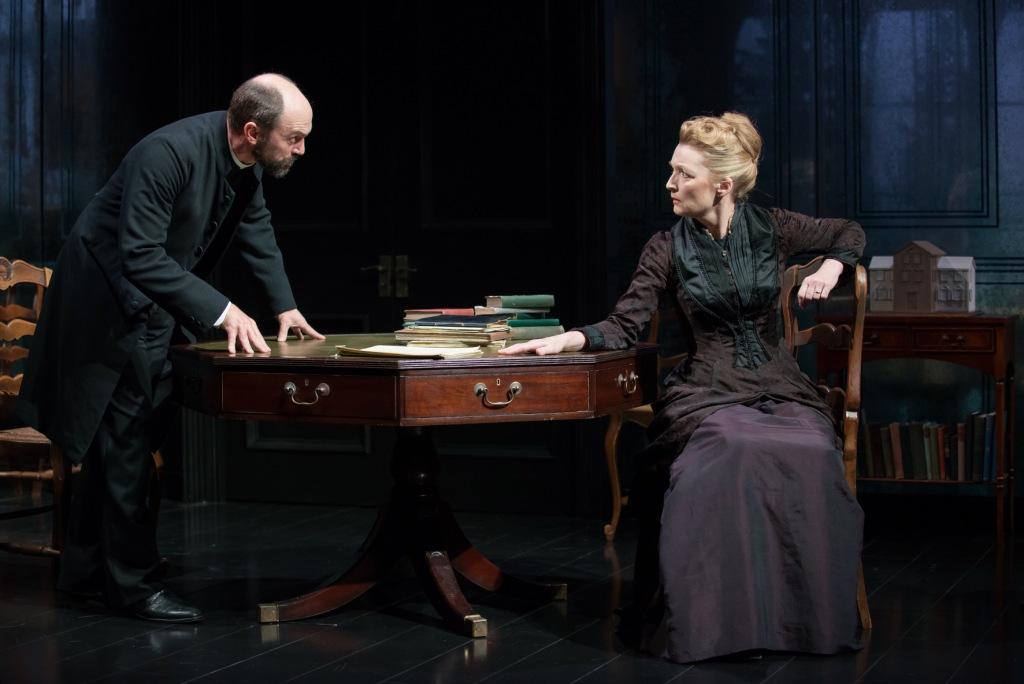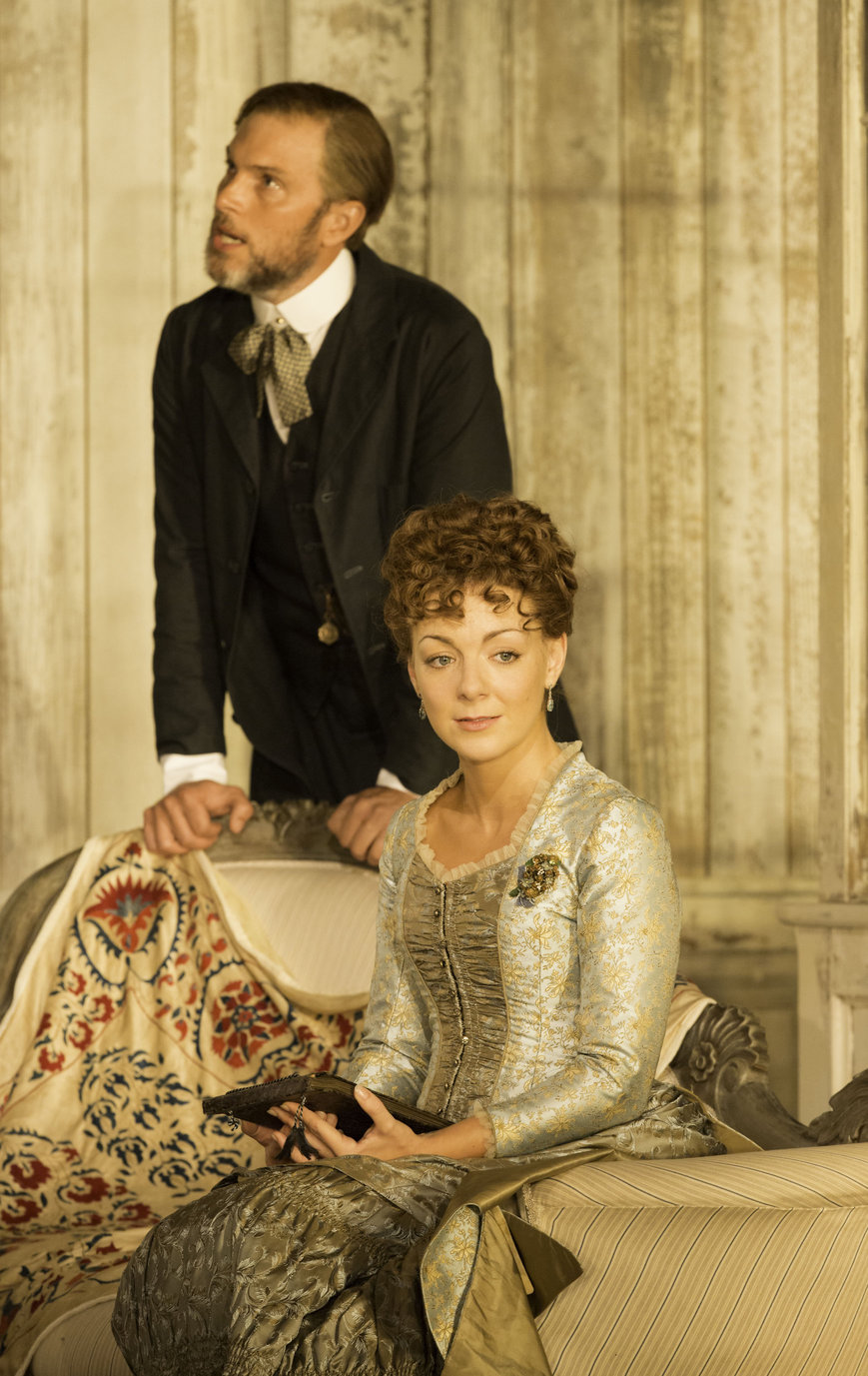Ghosts, Almeida Theatre | reviews, news & interviews
Ghosts, Almeida Theatre
Ghosts, Almeida Theatre
Director Richard Eyre shines light into Ibsen's dark thriller of family misfortunes

In a moment of scalding intensity at the climax of Ghosts, terrified Oswald sees the sun. Throughout the rest of Ibsen’s celebrated drama about the sins of the past, light is fairly absent. Merely cataloguing the disasters that befall its heroine Mrs Alving would certainly indicate a play living up to Ibsen’s bad reputation as the leading dramatist of doom and gloom.
Much of the tension of the 1881 play derives from the fact that everyone is defined by and trying to escape their past. Attempting to place a full stop at the end of a difficult widowhood, Mrs Alving (Lesley Manville) is about to open a neighbouring orphanage in the name of her heroic late husband. Her old friend and colleague Pastor Manders, with whom she built the orphanage, is anxious that the past strong attraction between them remain unacknowledged so that his reputation can remain intact.
The more buried the secrets, the more everyone has to lie
Mrs Alving’s maid Regina (beady, ambitious Charlene McKenna), nursing a secret promise from Mrs Alving’s son Oswald (Jack Lowden) wants to run away to Paris with him and escape her class and her reprobate father Jacob (Brian McCardle). Jacob, a man with a past as dodgy as his present, wants control of Regina since he intends her to join him in the “home for seamen” he’s planning to run. Oswald, meanwhile, newly returned from Paris, is wracked by so-far-unspoken terror: he’s terminally ill with an unmentionable disease.
The more buried the secrets, the more everyone has to lie. And if that weren’t trouble enough, forward-thinking Mrs Alving, refusing to be hidebound by the small-minded society around her, changes the rules everyone lives by. Manville (pictured below, with Will Keen) shimmers with energy as she reveals the truth about her disastrous marriage to Will Keen’s ultra-fastidious Pastor. Forever neatening his jacket and smoothing his hair, Keen deftly presents a pillar of rectitude whose constant upright manner is at war with fiercely suppressed emotion.
 Manipulation is the play’s motor. For good and ill, the revealing of truth produces guilty knowledge which characters use to their advantage. Chief among these is the disclosure of Regina’s parentage, a fact with appalling repurcussions seized on by everyone with further extraordinary turns of the screw.
Manipulation is the play’s motor. For good and ill, the revealing of truth produces guilty knowledge which characters use to their advantage. Chief among these is the disclosure of Regina’s parentage, a fact with appalling repurcussions seized on by everyone with further extraordinary turns of the screw.
The sure-footedness of Eyre’s direction is made clear whenever the characters obfuscate or lie. Instead of giving the game away with over-indicated subtext, the actors hold audiences rapt. Against all odds, Jacob has to argue himself out of a very tight corner with Manders and their confrontation remains on a knife-edge because McCardle outwardly appears wholly convincing while speaking what we know to be hastily made-up excuses.
One of the problems with the play is where to put the interval. Eyre’s highly effective solution is to play it without one. This not only underlines the connections between everything that happens and their dramatic consequences, it maintains tension since the action takes places over one terrible night.
The inexorable build-up of tension is beautifully calibrated not just by Eyre but by Peter Mumford whose evocative lighting of Tim Hatley’s glass-walled, necessarily period set shifts imperceptibly. The soft, grey intensity of a Hammershøi interior slips down to an exciting degree of darkness as the notably well-cast Manville and Lowden slug it out in their final showdown.
In keeping with the production’s tone, Lowden opts not to give away too much of Oswald’s terror too soon. Exuding the lanky lassitude of a golden boy gone to the bad, he only latterly displays physical wretchedness. It’s a risky strategy that, at the fifth preview, didn’t quite come off since it left Manville too little time to descend into horror as it hits her that he wants to tear away at her reason for living. As it stands, despite bold physicality between them, Manville’s nightmare currently feels a shade considered and lacks upsetting abandonment. The tenor of the production, however, suggests that by the time you read this, they’ll have got there.
MORE IBSEN ON THEARTSDESK
Ghosts, Duchess Theatre (2010). Iain Glen makes directorial debut with a straightforward take starring Lesley Sharp
The Master Builder, Almeida Theatre (2010). Passions blow hot and cold in this uneven production starring Gemma Arterton and Stephen Dillane
Emperor and Galilean, National Theatre (2011). Power and pace help to exhume Ibsen's Romano-Christian epic starring Andrew Scott
Judgement Day, The Print Room (2011). Ibsen's last play has its issues but emerges strongly in new adaptation with Michael Pennington
The Lady From the Sea, Rose Theatre, Kingston (2012). Joely Richardson takes on the Ibsen heroine her mother and sister made their own
A Doll's House, Young Vic (2012). Period setting yields a contemporary tragedy adapted by Simon Stephens and starring Hattie Morahan
 Hedda Gabler, Old Vic (2012). Ibsen's heroine draws new depths from the West End's sweetheart Sheridan Smith (pictured)
Hedda Gabler, Old Vic (2012). Ibsen's heroine draws new depths from the West End's sweetheart Sheridan Smith (pictured)
Love's Comedy, Orange Tree Theatre (2012). Early Ibsen finds the playwright in his awkward adolescence
A Doll's House, Royal Exchange (2013). Ibsen in the round loses none of its power to cast a spell
Public Enemy, Young Vic (2013). The horrors of local politics still chime in Richard Jones's queasy production of an Ibsen masterpiece
Peer Gynt, Théâtre National de Nice (2014). Irina Brook's song-and-dance Ibsen entertains, but misses the darker shades
The Wild Duck, Belvoir Sydney (2014). Heartbreaking adaptation mixes naturalism and forensic examination
Little Eyolf, Almeida Theatre (2015). Strong women and one weak man in Ibsen's swift study of isolation and guilt
The Master Builder, Old Vic (2016). Ralph Fiennes stars in Ibsen's unsettling mix of the real and the supernatural
Hedda Gabler, National Theatre (2016). Ivo van Hove makes an uneven Southbank debut
rating
Share this article
The future of Arts Journalism
You can stop theartsdesk.com closing!
We urgently need financing to survive. Our fundraising drive has thus far raised £49,000 but we need to reach £100,000 or we will be forced to close. Please contribute here: https://gofund.me/c3f6033d
And if you can forward this information to anyone who might assist, we’d be grateful.

Subscribe to theartsdesk.com
Thank you for continuing to read our work on theartsdesk.com. For unlimited access to every article in its entirety, including our archive of more than 15,000 pieces, we're asking for £5 per month or £40 per year. We feel it's a very good deal, and hope you do too.
To take a subscription now simply click here.
And if you're looking for that extra gift for a friend or family member, why not treat them to a theartsdesk.com gift subscription?
more Theatre
 Othello, Theatre Royal, Haymarket review - a surprising mix of stateliness and ironic humour
David Harewood and Toby Jones at odds
Othello, Theatre Royal, Haymarket review - a surprising mix of stateliness and ironic humour
David Harewood and Toby Jones at odds
 Macbeth, RSC, Stratford review - Glaswegian gangs and ghoulies prove gripping
Sam Heughan's Macbeth cannot quite find a home in a mobster pub
Macbeth, RSC, Stratford review - Glaswegian gangs and ghoulies prove gripping
Sam Heughan's Macbeth cannot quite find a home in a mobster pub
 The Line of Beauty, Almeida Theatre review - the 80s revisited in theatrically ravishing form
Alan Hollinghurst novel is cunningly filleted, very finely acted
The Line of Beauty, Almeida Theatre review - the 80s revisited in theatrically ravishing form
Alan Hollinghurst novel is cunningly filleted, very finely acted
 Wendy & Peter Pan, Barbican Theatre review - mixed bag of panto and comic play, turned up to 11
The RSC adaptation is aimed at children, though all will thrill to its spectacle
Wendy & Peter Pan, Barbican Theatre review - mixed bag of panto and comic play, turned up to 11
The RSC adaptation is aimed at children, though all will thrill to its spectacle
 Hedda, Orange Tree Theatre review - a monument reimagined, perhaps even improved
Scandinavian masterpiece transplanted into a London reeling from the ravages of war
Hedda, Orange Tree Theatre review - a monument reimagined, perhaps even improved
Scandinavian masterpiece transplanted into a London reeling from the ravages of war
 The Assembled Parties, Hampstead review - a rarity, a well-made play delivered straight
Witty but poignant tribute to the strength of family ties as all around disintegrates
The Assembled Parties, Hampstead review - a rarity, a well-made play delivered straight
Witty but poignant tribute to the strength of family ties as all around disintegrates
 Mary Page Marlowe, Old Vic review - a starry portrait of a splintered life
Tracy Letts's Off Broadway play makes a shimmeringly powerful London debut
Mary Page Marlowe, Old Vic review - a starry portrait of a splintered life
Tracy Letts's Off Broadway play makes a shimmeringly powerful London debut
 Little Brother, Soho Theatre review - light, bright but emotionally true
This Verity Bargate Award-winning dramedy is entertaining as well as thought provoking
Little Brother, Soho Theatre review - light, bright but emotionally true
This Verity Bargate Award-winning dramedy is entertaining as well as thought provoking
 The Unbelievers, Royal Court Theatre - grimly compelling, powerfully performed
Nick Payne's new play is amongst his best
The Unbelievers, Royal Court Theatre - grimly compelling, powerfully performed
Nick Payne's new play is amongst his best
 The Maids, Donmar Warehouse review - vibrant cast lost in a spectacular-looking fever dream
Kip Williams revises Genet, with little gained in the update except eye-popping visuals
The Maids, Donmar Warehouse review - vibrant cast lost in a spectacular-looking fever dream
Kip Williams revises Genet, with little gained in the update except eye-popping visuals
 Ragdoll, Jermyn Street Theatre review - compelling and emotionally truthful
Katherine Moar returns with a Patty Hearst-inspired follow up to her debut hit 'Farm Hall'
Ragdoll, Jermyn Street Theatre review - compelling and emotionally truthful
Katherine Moar returns with a Patty Hearst-inspired follow up to her debut hit 'Farm Hall'
 Troilus and Cressida, Globe Theatre review - a 'problem play' with added problems
Raucous and carnivalesque, but also ugly and incomprehensible
Troilus and Cressida, Globe Theatre review - a 'problem play' with added problems
Raucous and carnivalesque, but also ugly and incomprehensible

Add comment